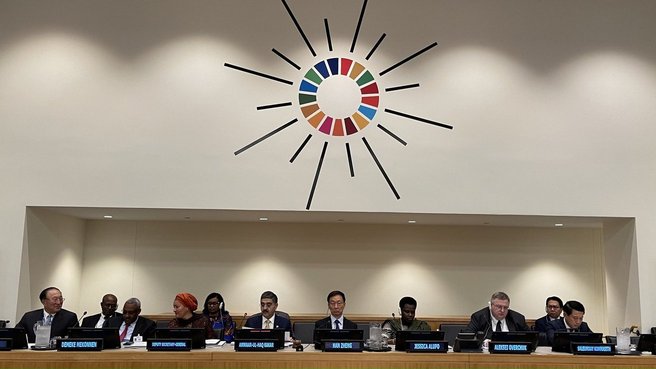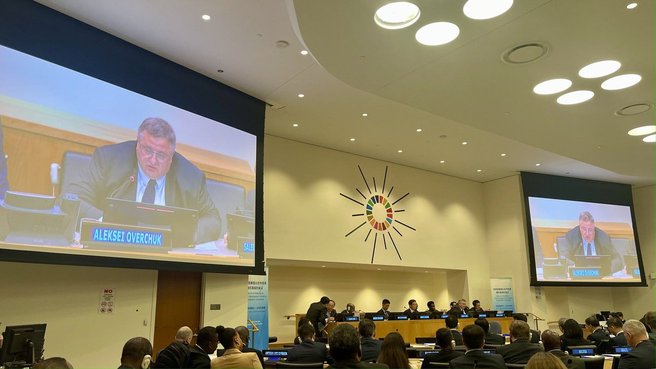Russian Deputy Prime Minister Alexei Overchuk spoke at a high-level meeting on the Global Development Initiative, part of the Sustainable Development Goals (SDG) Summit under the auspices of the UN General Assembly held on 18-19 September in New York.
Excerpts from the transcript:
Alexei Overchuk’s remarks at a high-level meeting on the Global Development Initiative, part of the Sustainable Development Goals Summit under the auspices of the UN General Assembly
Alexei Overchuk: Your Excellency Vice President of the People’s Republic of China Han Zheng, your Excellencies, dear friends,
First of all, allow me to thank the People’s Republic of China for organising this important event.
According to the UN Secretariat, we are now seriously lagging behind in achieving sustainable development goals. Countries are on track to meet just 12 percent of SDG targets, while making very little or zero progress with 50 percent of them, and posting no progress at all with 30 percent. The Covid-19 pandemic was followed by new global threats, caused by Western countries’ illegitimate sanctions. A reluctance to reach agreement on mutual security guarantees and increasingly aggressive pressure on other countries to force them to adopt the appropriate behavioural line served to undermine the foundations of the existing economic system.
Developing countries are suffering most of all from contemporary challenges. For example, during the acute phase of the Covid-19 pandemic in 2020-2021, we witnessed a tremendous gap in Covid vaccination rates (60 percent in industrial countries, compared to 4 percent in the poorest countries). At the same time, vaccines close to their expiry date were supplied to developing countries as left-overs, and European and North American regulators later recognised them as undesirable or substandard (low-quality).
Our partners from the global South are suffering from the green agenda that is being aggressively imposed. By forcing them to renounce the use of fossil energy sources and fuels and to assume excessive climate obligations, Western countries are essentially compelling the developing world to shoulder the main burden of real actions in the climate sphere. Skyrocketing energy prices on global markets may spell tragedy for the majority of the poorest countries that are already facing energy shortages.
Russia has always devoted special attention to assisting developing countries in accordance with their priorities and national development strategies. In 2021 alone, the Russian budget stipulated $1.2 billion worth of funding for official development assistance projects. We are also determined to continue supporting UN efforts within the framework of South-South cooperation.
We would like to dwell separately on the issue of unilateral coercive measures (UCM) that inflict tremendous harm on the entire global economy and provoke far-reaching negative consequences. This exerts a particularly negative impact on food security in the context of impairing Russia’s ability to export food and fertilisers, primarily to developing countries.
We believe that the practice of unilateral coercive measures is unacceptable, and that it limits opportunities for socio-economic development. These actions run counter to generally recognised norms of international law, undermine sovereignty and fundamental human rights and freedoms, exacerbate inequality between states, downplay the efforts of countries to achieve Sustainable Development Goals and also violate the fundamental principle of the Agenda for Sustainable Development (2030 Agenda) that aims to leave no one behind. Any sanction restrictions primarily impact the most vulnerable segments of the population and considerably limit their access to basic services or deny them such access.
In these conditions, the creation of a truly equitable and multipolar world order is becoming more and more topical. It is necessary to jointly advance common approaches, to merge positions to the greatest possible extent and to strive to scale down global tensions. It is necessary to do all this, while complying with the principles of the Agenda 2030, specifically, mutually advantageous cooperation, solidarity and merging economic potentials for the sake of reconstruction and development. We believe that the Global Development Initiative completely meets these objectives.
Thank you.













